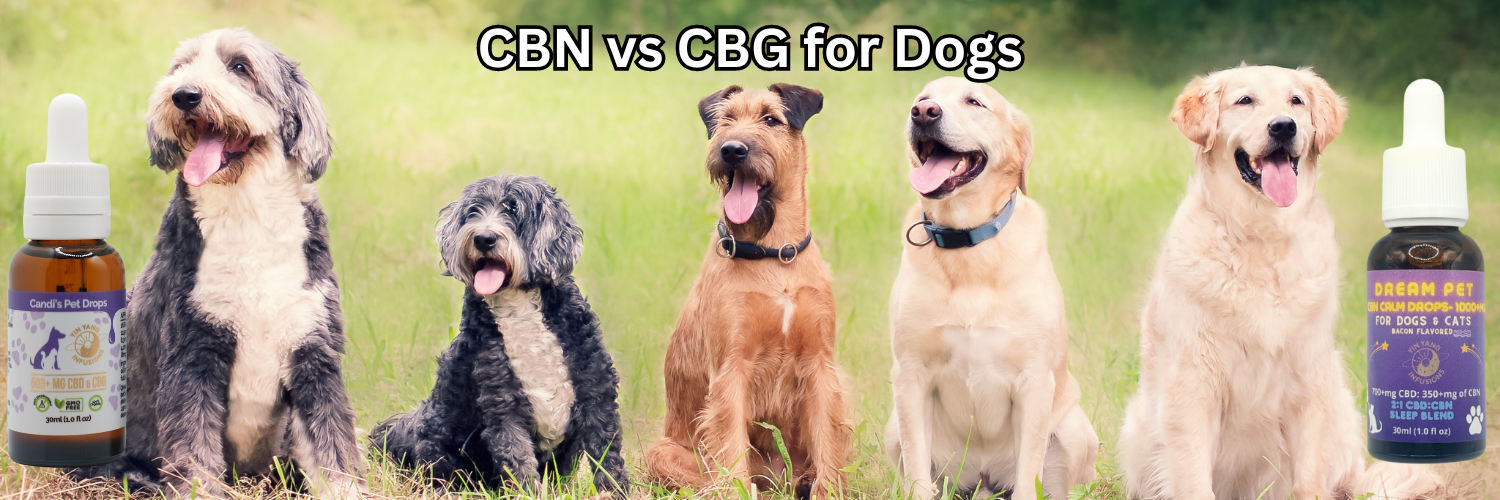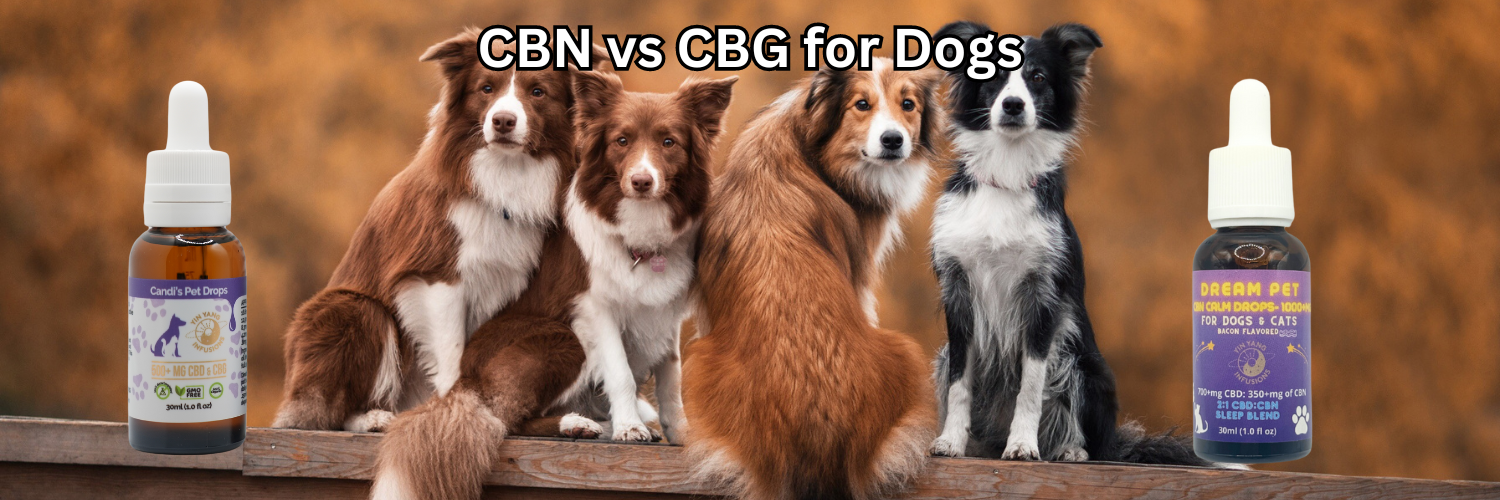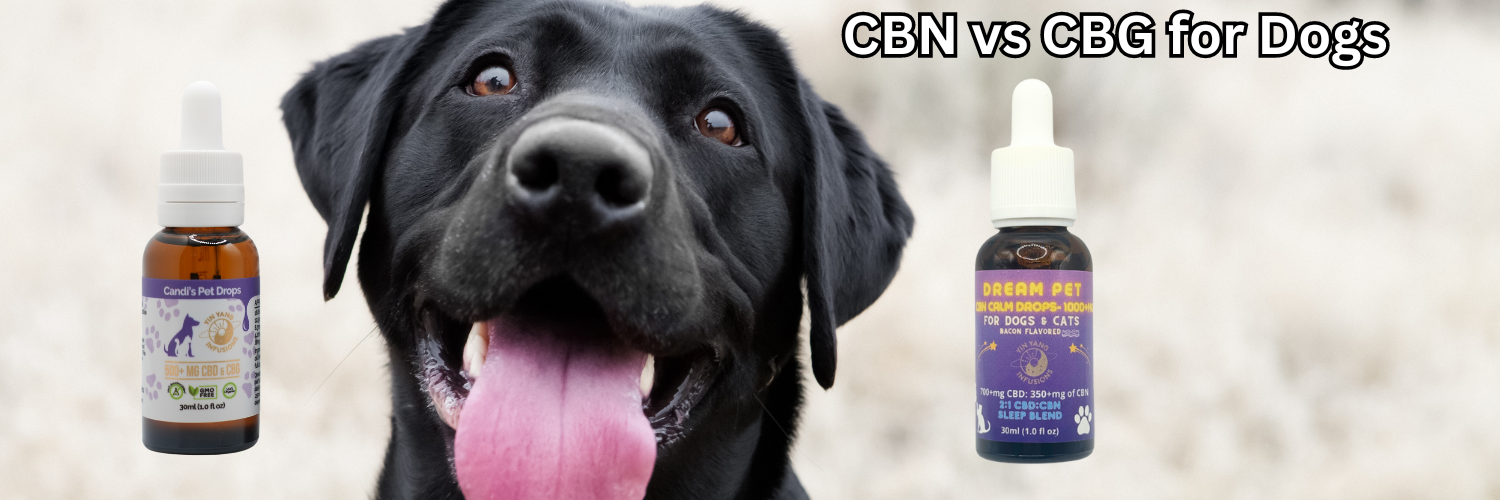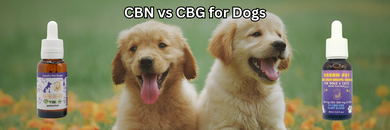CBN vs. CBG for Dogs: A Comparative Guide
As pet wellness trends grow, more dog owners are turning to natural cannabinoids like CBN and CBG to support their pets. These hemp-based compounds offer potential calming and balancing effects. In this article, we will explore and compare CBN and CBG for dogs, outlining their similarities, differences, and how to choose the best option for your furry friend.
What Are CBN and CBG?
What is CBN?
CBN, or cannabinol, is a non-psychoactive cannabinoid formed as THC degrades over time. Pet owners are increasingly using CBN for its reported calming effects, especially in stressful situations. It is often used to help maintain a calm demeanor in dogs without the psychoactive effects of THC.
What is CBG?
CBG, or cannabigerol, is known as the "mother cannabinoid" because it is the precursor to other cannabinoids like CBD and THC. CBG has become popular among pet owners looking for natural ways to help their dogs manage everyday stress and maintain balance.

Similarities Between CBN and CBG for Dogs
Non-Psychoactive Cannabinoids
Both CBN and CBG are non-psychoactive, meaning they won’t cause any “high” sensations in dogs. This makes them safe for pets, particularly when formulated in broad-spectrum products without THC.
Multiple Formats Available
CBN and CBG come in various formats for dogs, such as oils, tinctures, and treats. These can be easily administered by adding them to your dog’s food or giving them directly, depending on your dog’s preferences and needs.
Support for Calm and Relaxation
Pet owners commonly report using both CBN and CBG to promote a calm and relaxed state in dogs. Whether it’s separation-related stress, loud noises, or new environments, these cannabinoids are often used to help dogs remain balanced and comfortable.

The Entourage Effect
CBN and CBG work synergistically when combined with other cannabinoids like CBD, enhancing each other’s effects. This is known as the "entourage effect," and it’s a common reason why pet owners opt for broad-spectrum hemp products containing multiple cannabinoids.
Key Differences Between CBN and CBG for Dogs
Origins of CBN and CBG
CBN originates from the degradation of THC, making it a byproduct of aging cannabis plants. In contrast, CBG is a precursor to other cannabinoids and is found in higher concentrations in younger cannabis plants.
Effect Profiles: Calming vs. Balanced
CBN is known for its more pronounced calming effects, making it ideal for situations requiring relaxation, such as before vet visits or during fireworks. CBG, while also calming, is more often used for maintaining overall balance and managing daily stresses like separation.
Best Use Cases
CBN is typically used for short-term, intense situations that require immediate calming effects, such as long car rides or recovery after a procedure. CBG is more suited for ongoing challenges like separation or stress related to loud noises, providing a gentle support system.
Duration of Effects
CBN tends to take effect faster, especially when given directly via a tincture, and lasts 4-6 hours. CBG, especially when consumed with food, may take longer to show results but tends to last up to 8 hours, making it ideal for more sustained support.
Choosing Between CBN and CBG for Dogs

When to Choose CBN
If your dog needs help calming down during short-term high-stress events, such as fireworks, vet visits, or car rides, CBN may be the best choice. Its stronger sedative-like properties make it more effective in these situations.
When to Choose CBG
CBG is a better option for helping dogs maintain calm and balance during more routine or ongoing challenges like separation anxiety or reactive behavior in crowded environments. It provides gentle, sustained effects without overly sedating your pet.
Broad-Spectrum Products for Dogs: Combining CBN and CBG
For pet owners seeking the best of both worlds, broad-spectrum hemp products that combine CBN, CBG, and CBD can enhance the overall effects through the entourage effect. This combination allows for a balanced and holistic approach to supporting your dog’s well-being.
CBN vs CBG for dogs in a nutshell
Both CBN and CBG offer exciting natural options for dog owners looking to maintain their pet's calm and balance. While CBN may be better suited for high-stress, short-term situations, CBG provides ongoing support for daily challenges. As always, consult your veterinarian before introducing any new supplements, and monitor your dog’s response to find the optimal dose. Whether used individually or in combination, CBN and CBG are promising tools for supporting your dog’s overall well-being.
CBN and CBG for dogs FAQ
1. What is the difference between CBG and CBN for dogs?
CBG (cannabigerol) and CBN (cannabinol) are both non-psychoactive cannabinoids, but they differ in how they are formed and their effects. CBG is the precursor to other cannabinoids and is found in higher concentrations in young cannabis plants. It’s often used to support dogs with stress or reactive behaviors. CBN is a byproduct of THC degradation and is known for its calming and potentially sedative effects, making it useful for high-stress situations or to promote relaxation.
2. Is CBN or CBG better for calming my dog?
Both CBN and CBG have calming properties, but CBN tends to be more sedative, making it a better option for dogs that need to relax quickly, such as during fireworks or vet visits. CBG is more suitable for long-term, gentle calming effects, such as helping dogs with separation-related stress or ongoing reactive behaviors.
3. Can CBG or CBN make my dog high?
No, neither CBG nor CBN will make your dog high. Both cannabinoids are non-psychoactive, meaning they do not produce the “high” associated with THC. They are safe to use for dogs without causing any psychoactive effects, as long as they are sourced from broad-spectrum products that do not contain THC.
4. How should I give CBN or CBG to my dog?
CBN and CBG can be administered in various ways, including tinctures, treats, or oils. Sublingual tinctures (under the tongue) provide faster effects, taking about 10-20 minutes to kick in. If given with food or treats, the effects may take 40 minutes to an hour to start but will last longer. Always start with a small dose and observe how your dog responds before adjusting the dosage.
5. Are CBG and CBN safe for dogs?
Yes, CBG and CBN are generally considered safe for dogs when given in appropriate doses. Both cannabinoids are natural compounds found in the cannabis plant and are non-toxic for dogs. However, it’s important to consult with a veterinarian before giving your dog any new supplements, especially if your dog is on other medications or has specific health concerns.
6. How much CBN or CBG should I give my dog?
The recommended dosage for both CBN and CBG depends on your dog’s weight and the desired effect. A general guideline is 0.25 mg to 0.5 mg per pound of body weight. For calming purposes, smaller doses of CBN (around 0.25 mg per pound) can be effective, while larger doses (0.5 mg to 1 mg per pound) may be used for sedative effects. Similarly, CBG dosages can range from 0.25 mg to 0.5 mg per pound for maintaining a calm state.
7. Can I give my dog both CBN and CBG at the same time?
Yes, you can give your dog both CBN and CBG at the same time. In fact, many pet owners opt for broad-spectrum products that contain multiple cannabinoids, including CBN, CBG, and CBD. This combination enhances the effects of each cannabinoid through what is known as the entourage effect, making the overall impact more balanced and effective.
8. What are the benefits of CBN vs. CBG for dogs?
CBN is particularly beneficial for situations that require calming or sleep support, such as during long trips or loud events like thunderstorms. CBG, on the other hand, is often used to support dogs that are dealing with daily stressors like separation anxiety or reactivity to certain triggers. CBG provides a more balanced, ongoing calming effect without the sedative qualities of CBN.
9. How long do the effects of CBN or CBG last in dogs?
The duration of effects depends on how the CBN or CBG is administered. When given sublingually (under the tongue), the effects can start within 10-20 minutes and last for about 4-6 hours. When added to food or treats, the effects take longer to kick in (around 40 minutes to 1 hour) but can last for 6-8 hours, depending on the dosage and your dog’s metabolism.
10. Can I give my dog CBN or CBG every day?
Yes, you can give your dog CBN or CBG daily if needed, especially in cases of chronic stress or when maintaining a calm state is important. However, it's essential to monitor your dog's response to the cannabinoids and adjust the dosage as necessary. Starting with a lower dose and gradually increasing as needed is always a safe approach. Consulting with a veterinarian before adding daily supplements is also recommended.

